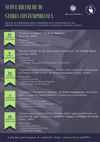Books by Bruno Walter Renato Toscano

Pantere nere, America bianca. Storia e politica del Black Panther Party, 2023
Il Partito delle Pantere nere, celebre per la difesa in armi della comunità afroamericana dalla v... more Il Partito delle Pantere nere, celebre per la difesa in armi della comunità afroamericana dalla violenza della polizia e simbolo del lungo Sessantotto, per molto tempo è stato considerato dai media e dalle autorità statunitensi al pari di un gruppo terroristico o criminale. Esso fu invece un’organizzazione dalle numerose sfaccettature, capace di mobilitare attivisti contro i paradossi del sistema capitalista statunitense e di denunciare l’emarginazione delle minoranze. Diviso tra istanze rivoluzionarie e riformiste, il Black Panther Party cambiò ideologia senza soluzione di continuità, adattandosi a scenari politici in continua evoluzione. Fu una realtà politica in grado di dialogare con le organizzazioni della nuova sinistra così come con il movimento per i diritti civili e i nazionalisti neri. Il rapporto tra classe, razza e genere si impose così al centro dell’attivismo dell’organizzazione, in quanto fondamento di una rivoluzione sociale che avrebbe dovuto soddisfare i bisogni più profondi degli emarginati in una nazione tuttora divisa dalla linea del colore.
Pantere nere, America bianca ripercorre la storia e l’ideologia del Black Panther Party a partire dai suoi protagonisti, facendo ricorso a fonti statunitensi e introducendo nella storiografia italiana un nuovo punto di vista sulla sua formazione e dissoluzione.
Papers by Bruno Walter Renato Toscano

‘Work locally but think globally’: The Alliance Against Women's Oppression and transnational multiracial grassroots activism in the 1980s, 2024
This article examines the transnational history of the Alliance Against Women's Oppression (AAWO)... more This article examines the transnational history of the Alliance Against Women's Oppression (AAWO), a multiracial and Marxist US women's organisation founded in California in 1979. By focusing on the political connection between the AAWO, the so-called ‘Third World’ and other international organisations such as the Women International Democratic Federation, the article intends to delve into the relationship between global far-left, non-White women's organisations in the United States and the Global South. Using extensive archival sources internal to the organisation, this work highlights the 1980s as a central period for anti-imperialist women's activism against the Reagan administration and for the formation of international grassroots connections.

Contemporanea , 2023
This article examines the history of Third World Women’s Alliance (TWWA), a significant proto-int... more This article examines the history of Third World Women’s Alliance (TWWA), a significant proto-intersectional feminist organization involving women of color during the Sixties and Seventies, through a transnational lens. Drawing on archival sources and oral interviews, the article argues that transnationalism played a pivotal role in shaping the TWWA’s antiimperialist ideology and activism. The first section of the article emphasizes the TWWA’s transnational roots by exploring the connection between Frances M. Beal, one of its founders, and African American intellectuals active in Paris, as well as African students in France during the Sixties. The second section delves into the TWWA’s participation in the two Indochinese Women’s Conferences held in Vancouver and Toronto in 1971, highlighting the TWWA’s reputation as one of the important organizations of women of color in the United States and explores the ongoing connections between the TWWA and Vietnamese delegations in Canada following the conferences. In the final two sections, the article examines how Cuba became a contested site for defining the intricate relationship between gender, race, and class in the United States, and how it served as a political reference point that impacted the TWWA’s activism.
JAm It!, 2022
Introduction to issue 6 of JAm IT! - Journal of American Studies in Italy

Journal of American Studies in Italy (JAm It!), 2022
The quest to define the true essence of US identity dates back to colonial times, long before the... more The quest to define the true essence of US identity dates back to colonial times, long before the nation itself was formally established. Yet, scholars traditionally situate the first explicit investigation into what constitutes an American citizen in J. Hector St. John de Crèvecœur’s Letters from an American Farmer (1782). The third of the titular letters, aptly named “What is an American,” offers a list of features that de Crèvecœur considered quintessential to Americanness: industry, freedom, individualism, equality, assimilation. All these elements converged in what later became known as American exceptionalism, a doctrine that undergirded (and, to an extent, still undergirds) most, if not all, of US foreign policy.
De Crevecoeur’s essay also introduced the concept of the ‘melting pot’ to describe the yearned-for-homogeneity of a nation aspiring to merge the different cultures informing it, rather than to preserve their differences. Ever since, the United States has strived to present a solid front against the rest of the world, returning time and time again to the defining features of its citizens, and to what sets them apart from their European counterparts. Yet, over the past few decades, it has become evident that internal divisions and differences are increasing, rather than decreasing. While the national narrative of the United States insists on advocating the exceptionality of its people, it is also continuously confronted by the hard truth of their lived experiences (Sieber 2005; Hodgson 2009; Grandin 2019; Spragg 2019).
A kind of internal splintering is especially noticeable in the polarization of contemporary public discourse and in the way it has exposed a country fractured into factions and bitter divisions across identity lines. Long overdue civil, political, and social rights battles have radicalized most public debates, from racial issues connected to voting rights and disenfranchisement (e.g., the long fight to ensure voting rights to African Americans, from the birth of the NAACP at the beginning of the twentieth century to the recent Fair Fight Action movement) to questions of representation and cultural appropriation (e.g., the debate surrounding Jeanine Cummins’s 2020 novel American Dirt, Scarlett Johansson’s casting as a Japanese character in the 2017 movie Ghost in the Shell, or the controversial use of fashion and hairstyles belonging to different cultures, as in the case of Katy Perry’s performance at the 2013 American Music Awards or Justin Bieber’s latest hair-dos).
Furthermore, the United States has always been on the lookout for an enemy that would reinforce its own identity. During the American Frontier expansion, such figure was embodied by Native people living on conquered lands. Later on, a similar antagonistic mechanism was fueled by the animosity against Germany, sparked during the first global conflict and exacerbated during WWII. During the Cold War, the role of the archenemy was then played by the “Commies'' and,after the turn of the century, by “Arab terrorists.” Yet, despite its readiness to intervene on the international military stage and to single out an enemy that could function as its archetypal rival, the United States has also long been fractured by visceral internal fights. More than ever, after the January 6, 2021 attacks on the Capitol, an especially American tradition of domestic violence—spanning from the Civil War to the Civil Rights Movement—has taken center stage, leading to a reckoning that the enemy oftentimes lies within the nation itself.
This issue of JAm It! seeks contributions that address how different iterations of real and/or symbolic internal enemies have been generated and represented in US culture. Further, we invite reflections on how, on the level of policy, discourse, and societal dynamics, such internal divisions have been flattened out for the sake of a uniform—rather than united—nation. Finally, to encourage a nuanced and balanced understanding of the topic, we also welcome contributions that highlight how fractures and differences, as well as the very need for a real or imagined internal enemy, have had virtuous outcomes in US history and its formation.
Reviewed by Bruno Walter Renato Toscano n his latest book, We Shall Not Be Moved, the historian A... more Reviewed by Bruno Walter Renato Toscano n his latest book, We Shall Not Be Moved, the historian Alessandro Portelli describes the history of American radicalism through some audio tracks collected during his research stays in the United States. Starting from the Appalachian coal mines' music tradition, the
Sémata, Mar 25, 2022
Spazi di eccezione nel Cile di Pinochet: un'analisi di genere delle violenze sessuali nei centros... more Spazi di eccezione nel Cile di Pinochet: un'analisi di genere delle violenze sessuali nei centros de detención (1973-1989

Sémata. Ciencias Sociais e Humanidades, 2021
This article aims to examine the sexual violence occurred in Chilean prison camposduring the Pino... more This article aims to examine the sexual violence occurred in Chilean prison camposduring the Pinochet regime (1973-1989) by drawing on Giorgio Agamben's definition of the State of Exception. With the intent of showing the continuity between the Neoliberal turn of post-Pinochet Chile and the separation of masculinity and femininity in the prison camps, both the statements of the victims - men and women - and the testimonies published by the Commissions of Truth in the years following the military regime will be analyzed. In this way the biopolitical purpose of sexual violence will be emphasized: this approach intended to fix on the victims' bodies a defined gender identity and to which a process of separation between private and public spheres had to correspond. Finally, the article will explain how sexual violence was the result of a broader operation of political refounding of Chile after the coup was.

Le donne, il fordismo, Gramsci: una prospettiva di genere sulla società statunitense (1909-1930), Dec 30, 2017
One of the least discussed topics about the analysis of Fordism is certainly that concerning wome... more One of the least discussed topics about the analysis of Fordism is certainly that concerning women. Although the publications have been written about it, a complete research has not been outlined. This article will attempt to analyse the connection between Fordism and gender relations – both internals and externals to the automotive factory – in the period that includes the first decade of the Twentieth Century and the years immediately preceding the outbreak of the Second World War. Particular attention will be paid to the analysis of Gramsci in the Quaderni del Carcere about the concept of Fordism, and even to his interpretation of Americanism, Taylorism and «quistione sessuale», thus highlighting the role of women through three sometimes distinct but very often confused figures: womans as a labourer subject to certain industrial policies; woman as a part of the rationalisation process implemented by Henry Ford; woman as a consumer in automotive business of Ford industries.
Events convened by Bruno Walter Renato Toscano
#nuovericerchedistoriacontemporanea
Parte del ciclo di seminari 𝗡𝘂𝗼𝘃𝗲 𝗿𝗶𝗰𝗲𝗿𝗰𝗵𝗲 𝗱𝗶 𝗦𝘁𝗼𝗿𝗶𝗮 𝗰𝗼𝗻𝘁𝗲𝗺𝗽𝗼... more #nuovericerchedistoriacontemporanea
Parte del ciclo di seminari 𝗡𝘂𝗼𝘃𝗲 𝗿𝗶𝗰𝗲𝗿𝗰𝗵𝗲 𝗱𝗶 𝗦𝘁𝗼𝗿𝗶𝗮 𝗰𝗼𝗻𝘁𝗲𝗺𝗽𝗼𝗿𝗮𝗻𝗲𝗮. Primo incontro svolto online il 31 marzo 2021 alle 16:30 con la presentazione del volume "𝙀 𝙖𝙡𝙡𝙤𝙧𝙖 𝙡𝙚 𝙛𝙤𝙞𝙗𝙚?" di 𝗘𝗿𝗶𝗰 𝗚𝗼𝗯𝗲𝘁𝘁𝗶 (Editori Laterza, 2021).
Sono intervenuti l'autore Eric Gobetti e Gianluca Fulvetti (Università di Pisa).
Hanno coordinato e moderato Walter B. R. Toscano e Michele Magri.
link al video della registrazione: https://www.youtube.com/watch?v=YsifPn78t_A
#cfsunipi #civiltàeformedelsapere #unipi #foibe #storia #storiacontemporanea #editorilaterza

Ciclo di incontri "Nuove Ricerche di Storia Contemporanea" - Università di Pisa, Dipartimento di ... more Ciclo di incontri "Nuove Ricerche di Storia Contemporanea" - Università di Pisa, Dipartimento di Civiltà e Forme del Sapere, Corso di Dottorato in Storia
Presentazione di volumi di Storia Contemporanea di recente pubblicazione.
Eventi online, piattaforma Teams - Link: http://shorturl.at/mGPZ4
31/03/2021, ore 16:30 - Eric Gobetti, "E allora le foibe?" (Laterza, 2021)
Discussant: Eric Gobetti e Gianluca Fulvetti (Università di Pisa)
Con il patrocinio della casa editrice Laterza.
08/04/2021, ore 16:30 - Paolo Naso, "Martin Luther King. Una storia americana" (Laterza, 2021)
Discussant: Paolo Naso (Università di Roma La Sapienza) e Lorenzo Costaguta (University of Bristol)
Con il patrocinio della casa editrice Laterza.
16/04/2021, ore 16:30 - Vinzia Fiorino, "Il genere della cittadinanza. Diritti civili e politici delle donne in Francia (1789-1915)" (Viella, 2020)
Discussant: Vinzia Fiorino (Università di Pisa), Alessandra Gissi (Università di Napoli L'Orientale), Alberto Mario Banti (Università di Pisa)
07/05/2021, ore 16 - Delio Cantimori, "Utopisti e riformatori italiani", a cura di Lucio Biasiori e Francesco Torchiani (Donzelli, 2021)
Discussant: Lucio Biasiori (Università di Padova), Francesco Torchiani (Università di Pavia), Ignazio Veca (Università di Pisa)
13/05/2021, ore 16:30 - "Culture antisemite. Italia ed Europa dalle leggi antiebraiche ai razzismi di oggi", a cura di Annalisa Cegna e Filippo Focardi (Viella, 2021)
Discussant: Annalisa Cegna (Istituto Storico di Macerata - Università di Napoli L'Orientale), Ilaria Pavan (Scuola Normale Superiore - Pisa), Fabio Dei (Università di Pisa)

[EN]
"Multiple Identities. Problems, Methodologies and Sources from Antiquity to the Present Day... more [EN]
"Multiple Identities. Problems, Methodologies and Sources from Antiquity to the Present Day"
Pisa, Department of Civilisations and Forms of Knowledge, 10th - 11th - 12th December 2020
Three-days online seminar organised by the PhD Students in History at the University of Pisa.
The aim is to shed light on the complexity, overlapping and intersection of the different affiliations and constructions of identity. To do so, we will share new methodological and epistemological approaches, in a broad diachronic, global and interdisciplinary perspective. We are pleased to welcome scholars and researchers from universities and research institutions from different parts of the world.
Link to attend the webinar: bit.ly/3pAEp1Y
[IT]
"Identità Multiple. Problemi, metodologie e fonti dall'Antichità a oggi"
Pisa, Dipartimento di Civiltà e Forme del Sapere (CFS), 10 - 11 - 12 dicembre 2020
Tre giornate seminariali in forma telematica organizzate dalle dottorande e dai dottorandi in Storia dell'Università di Pisa.
L'intento è di far luce sulla complessità e sull’intersezione delle diverse appartenenze e costruzioni identitarie, condividendo nuovi approcci metodologici ed epistemologici in un'ampia prospettiva diacronica, globale e interdisciplinare. Siamo lieti di dare il benvenuto a studiose e studiosi, ricercatrici e ricercatori di università ed enti di ricerca di diverse parti del mondo.
Link per accedere al convegno: bit.ly/3pAEp1Y











Uploads
Books by Bruno Walter Renato Toscano
Pantere nere, America bianca ripercorre la storia e l’ideologia del Black Panther Party a partire dai suoi protagonisti, facendo ricorso a fonti statunitensi e introducendo nella storiografia italiana un nuovo punto di vista sulla sua formazione e dissoluzione.
Papers by Bruno Walter Renato Toscano
De Crevecoeur’s essay also introduced the concept of the ‘melting pot’ to describe the yearned-for-homogeneity of a nation aspiring to merge the different cultures informing it, rather than to preserve their differences. Ever since, the United States has strived to present a solid front against the rest of the world, returning time and time again to the defining features of its citizens, and to what sets them apart from their European counterparts. Yet, over the past few decades, it has become evident that internal divisions and differences are increasing, rather than decreasing. While the national narrative of the United States insists on advocating the exceptionality of its people, it is also continuously confronted by the hard truth of their lived experiences (Sieber 2005; Hodgson 2009; Grandin 2019; Spragg 2019).
A kind of internal splintering is especially noticeable in the polarization of contemporary public discourse and in the way it has exposed a country fractured into factions and bitter divisions across identity lines. Long overdue civil, political, and social rights battles have radicalized most public debates, from racial issues connected to voting rights and disenfranchisement (e.g., the long fight to ensure voting rights to African Americans, from the birth of the NAACP at the beginning of the twentieth century to the recent Fair Fight Action movement) to questions of representation and cultural appropriation (e.g., the debate surrounding Jeanine Cummins’s 2020 novel American Dirt, Scarlett Johansson’s casting as a Japanese character in the 2017 movie Ghost in the Shell, or the controversial use of fashion and hairstyles belonging to different cultures, as in the case of Katy Perry’s performance at the 2013 American Music Awards or Justin Bieber’s latest hair-dos).
Furthermore, the United States has always been on the lookout for an enemy that would reinforce its own identity. During the American Frontier expansion, such figure was embodied by Native people living on conquered lands. Later on, a similar antagonistic mechanism was fueled by the animosity against Germany, sparked during the first global conflict and exacerbated during WWII. During the Cold War, the role of the archenemy was then played by the “Commies'' and,after the turn of the century, by “Arab terrorists.” Yet, despite its readiness to intervene on the international military stage and to single out an enemy that could function as its archetypal rival, the United States has also long been fractured by visceral internal fights. More than ever, after the January 6, 2021 attacks on the Capitol, an especially American tradition of domestic violence—spanning from the Civil War to the Civil Rights Movement—has taken center stage, leading to a reckoning that the enemy oftentimes lies within the nation itself.
This issue of JAm It! seeks contributions that address how different iterations of real and/or symbolic internal enemies have been generated and represented in US culture. Further, we invite reflections on how, on the level of policy, discourse, and societal dynamics, such internal divisions have been flattened out for the sake of a uniform—rather than united—nation. Finally, to encourage a nuanced and balanced understanding of the topic, we also welcome contributions that highlight how fractures and differences, as well as the very need for a real or imagined internal enemy, have had virtuous outcomes in US history and its formation.
Events convened by Bruno Walter Renato Toscano
Parte del ciclo di seminari 𝗡𝘂𝗼𝘃𝗲 𝗿𝗶𝗰𝗲𝗿𝗰𝗵𝗲 𝗱𝗶 𝗦𝘁𝗼𝗿𝗶𝗮 𝗰𝗼𝗻𝘁𝗲𝗺𝗽𝗼𝗿𝗮𝗻𝗲𝗮. Primo incontro svolto online il 31 marzo 2021 alle 16:30 con la presentazione del volume "𝙀 𝙖𝙡𝙡𝙤𝙧𝙖 𝙡𝙚 𝙛𝙤𝙞𝙗𝙚?" di 𝗘𝗿𝗶𝗰 𝗚𝗼𝗯𝗲𝘁𝘁𝗶 (Editori Laterza, 2021).
Sono intervenuti l'autore Eric Gobetti e Gianluca Fulvetti (Università di Pisa).
Hanno coordinato e moderato Walter B. R. Toscano e Michele Magri.
link al video della registrazione: https://www.youtube.com/watch?v=YsifPn78t_A
#cfsunipi #civiltàeformedelsapere #unipi #foibe #storia #storiacontemporanea #editorilaterza
Presentazione di volumi di Storia Contemporanea di recente pubblicazione.
Eventi online, piattaforma Teams - Link: http://shorturl.at/mGPZ4
31/03/2021, ore 16:30 - Eric Gobetti, "E allora le foibe?" (Laterza, 2021)
Discussant: Eric Gobetti e Gianluca Fulvetti (Università di Pisa)
Con il patrocinio della casa editrice Laterza.
08/04/2021, ore 16:30 - Paolo Naso, "Martin Luther King. Una storia americana" (Laterza, 2021)
Discussant: Paolo Naso (Università di Roma La Sapienza) e Lorenzo Costaguta (University of Bristol)
Con il patrocinio della casa editrice Laterza.
16/04/2021, ore 16:30 - Vinzia Fiorino, "Il genere della cittadinanza. Diritti civili e politici delle donne in Francia (1789-1915)" (Viella, 2020)
Discussant: Vinzia Fiorino (Università di Pisa), Alessandra Gissi (Università di Napoli L'Orientale), Alberto Mario Banti (Università di Pisa)
07/05/2021, ore 16 - Delio Cantimori, "Utopisti e riformatori italiani", a cura di Lucio Biasiori e Francesco Torchiani (Donzelli, 2021)
Discussant: Lucio Biasiori (Università di Padova), Francesco Torchiani (Università di Pavia), Ignazio Veca (Università di Pisa)
13/05/2021, ore 16:30 - "Culture antisemite. Italia ed Europa dalle leggi antiebraiche ai razzismi di oggi", a cura di Annalisa Cegna e Filippo Focardi (Viella, 2021)
Discussant: Annalisa Cegna (Istituto Storico di Macerata - Università di Napoli L'Orientale), Ilaria Pavan (Scuola Normale Superiore - Pisa), Fabio Dei (Università di Pisa)
"Multiple Identities. Problems, Methodologies and Sources from Antiquity to the Present Day"
Pisa, Department of Civilisations and Forms of Knowledge, 10th - 11th - 12th December 2020
Three-days online seminar organised by the PhD Students in History at the University of Pisa.
The aim is to shed light on the complexity, overlapping and intersection of the different affiliations and constructions of identity. To do so, we will share new methodological and epistemological approaches, in a broad diachronic, global and interdisciplinary perspective. We are pleased to welcome scholars and researchers from universities and research institutions from different parts of the world.
Link to attend the webinar: bit.ly/3pAEp1Y
[IT]
"Identità Multiple. Problemi, metodologie e fonti dall'Antichità a oggi"
Pisa, Dipartimento di Civiltà e Forme del Sapere (CFS), 10 - 11 - 12 dicembre 2020
Tre giornate seminariali in forma telematica organizzate dalle dottorande e dai dottorandi in Storia dell'Università di Pisa.
L'intento è di far luce sulla complessità e sull’intersezione delle diverse appartenenze e costruzioni identitarie, condividendo nuovi approcci metodologici ed epistemologici in un'ampia prospettiva diacronica, globale e interdisciplinare. Siamo lieti di dare il benvenuto a studiose e studiosi, ricercatrici e ricercatori di università ed enti di ricerca di diverse parti del mondo.
Link per accedere al convegno: bit.ly/3pAEp1Y
Pantere nere, America bianca ripercorre la storia e l’ideologia del Black Panther Party a partire dai suoi protagonisti, facendo ricorso a fonti statunitensi e introducendo nella storiografia italiana un nuovo punto di vista sulla sua formazione e dissoluzione.
De Crevecoeur’s essay also introduced the concept of the ‘melting pot’ to describe the yearned-for-homogeneity of a nation aspiring to merge the different cultures informing it, rather than to preserve their differences. Ever since, the United States has strived to present a solid front against the rest of the world, returning time and time again to the defining features of its citizens, and to what sets them apart from their European counterparts. Yet, over the past few decades, it has become evident that internal divisions and differences are increasing, rather than decreasing. While the national narrative of the United States insists on advocating the exceptionality of its people, it is also continuously confronted by the hard truth of their lived experiences (Sieber 2005; Hodgson 2009; Grandin 2019; Spragg 2019).
A kind of internal splintering is especially noticeable in the polarization of contemporary public discourse and in the way it has exposed a country fractured into factions and bitter divisions across identity lines. Long overdue civil, political, and social rights battles have radicalized most public debates, from racial issues connected to voting rights and disenfranchisement (e.g., the long fight to ensure voting rights to African Americans, from the birth of the NAACP at the beginning of the twentieth century to the recent Fair Fight Action movement) to questions of representation and cultural appropriation (e.g., the debate surrounding Jeanine Cummins’s 2020 novel American Dirt, Scarlett Johansson’s casting as a Japanese character in the 2017 movie Ghost in the Shell, or the controversial use of fashion and hairstyles belonging to different cultures, as in the case of Katy Perry’s performance at the 2013 American Music Awards or Justin Bieber’s latest hair-dos).
Furthermore, the United States has always been on the lookout for an enemy that would reinforce its own identity. During the American Frontier expansion, such figure was embodied by Native people living on conquered lands. Later on, a similar antagonistic mechanism was fueled by the animosity against Germany, sparked during the first global conflict and exacerbated during WWII. During the Cold War, the role of the archenemy was then played by the “Commies'' and,after the turn of the century, by “Arab terrorists.” Yet, despite its readiness to intervene on the international military stage and to single out an enemy that could function as its archetypal rival, the United States has also long been fractured by visceral internal fights. More than ever, after the January 6, 2021 attacks on the Capitol, an especially American tradition of domestic violence—spanning from the Civil War to the Civil Rights Movement—has taken center stage, leading to a reckoning that the enemy oftentimes lies within the nation itself.
This issue of JAm It! seeks contributions that address how different iterations of real and/or symbolic internal enemies have been generated and represented in US culture. Further, we invite reflections on how, on the level of policy, discourse, and societal dynamics, such internal divisions have been flattened out for the sake of a uniform—rather than united—nation. Finally, to encourage a nuanced and balanced understanding of the topic, we also welcome contributions that highlight how fractures and differences, as well as the very need for a real or imagined internal enemy, have had virtuous outcomes in US history and its formation.
Parte del ciclo di seminari 𝗡𝘂𝗼𝘃𝗲 𝗿𝗶𝗰𝗲𝗿𝗰𝗵𝗲 𝗱𝗶 𝗦𝘁𝗼𝗿𝗶𝗮 𝗰𝗼𝗻𝘁𝗲𝗺𝗽𝗼𝗿𝗮𝗻𝗲𝗮. Primo incontro svolto online il 31 marzo 2021 alle 16:30 con la presentazione del volume "𝙀 𝙖𝙡𝙡𝙤𝙧𝙖 𝙡𝙚 𝙛𝙤𝙞𝙗𝙚?" di 𝗘𝗿𝗶𝗰 𝗚𝗼𝗯𝗲𝘁𝘁𝗶 (Editori Laterza, 2021).
Sono intervenuti l'autore Eric Gobetti e Gianluca Fulvetti (Università di Pisa).
Hanno coordinato e moderato Walter B. R. Toscano e Michele Magri.
link al video della registrazione: https://www.youtube.com/watch?v=YsifPn78t_A
#cfsunipi #civiltàeformedelsapere #unipi #foibe #storia #storiacontemporanea #editorilaterza
Presentazione di volumi di Storia Contemporanea di recente pubblicazione.
Eventi online, piattaforma Teams - Link: http://shorturl.at/mGPZ4
31/03/2021, ore 16:30 - Eric Gobetti, "E allora le foibe?" (Laterza, 2021)
Discussant: Eric Gobetti e Gianluca Fulvetti (Università di Pisa)
Con il patrocinio della casa editrice Laterza.
08/04/2021, ore 16:30 - Paolo Naso, "Martin Luther King. Una storia americana" (Laterza, 2021)
Discussant: Paolo Naso (Università di Roma La Sapienza) e Lorenzo Costaguta (University of Bristol)
Con il patrocinio della casa editrice Laterza.
16/04/2021, ore 16:30 - Vinzia Fiorino, "Il genere della cittadinanza. Diritti civili e politici delle donne in Francia (1789-1915)" (Viella, 2020)
Discussant: Vinzia Fiorino (Università di Pisa), Alessandra Gissi (Università di Napoli L'Orientale), Alberto Mario Banti (Università di Pisa)
07/05/2021, ore 16 - Delio Cantimori, "Utopisti e riformatori italiani", a cura di Lucio Biasiori e Francesco Torchiani (Donzelli, 2021)
Discussant: Lucio Biasiori (Università di Padova), Francesco Torchiani (Università di Pavia), Ignazio Veca (Università di Pisa)
13/05/2021, ore 16:30 - "Culture antisemite. Italia ed Europa dalle leggi antiebraiche ai razzismi di oggi", a cura di Annalisa Cegna e Filippo Focardi (Viella, 2021)
Discussant: Annalisa Cegna (Istituto Storico di Macerata - Università di Napoli L'Orientale), Ilaria Pavan (Scuola Normale Superiore - Pisa), Fabio Dei (Università di Pisa)
"Multiple Identities. Problems, Methodologies and Sources from Antiquity to the Present Day"
Pisa, Department of Civilisations and Forms of Knowledge, 10th - 11th - 12th December 2020
Three-days online seminar organised by the PhD Students in History at the University of Pisa.
The aim is to shed light on the complexity, overlapping and intersection of the different affiliations and constructions of identity. To do so, we will share new methodological and epistemological approaches, in a broad diachronic, global and interdisciplinary perspective. We are pleased to welcome scholars and researchers from universities and research institutions from different parts of the world.
Link to attend the webinar: bit.ly/3pAEp1Y
[IT]
"Identità Multiple. Problemi, metodologie e fonti dall'Antichità a oggi"
Pisa, Dipartimento di Civiltà e Forme del Sapere (CFS), 10 - 11 - 12 dicembre 2020
Tre giornate seminariali in forma telematica organizzate dalle dottorande e dai dottorandi in Storia dell'Università di Pisa.
L'intento è di far luce sulla complessità e sull’intersezione delle diverse appartenenze e costruzioni identitarie, condividendo nuovi approcci metodologici ed epistemologici in un'ampia prospettiva diacronica, globale e interdisciplinare. Siamo lieti di dare il benvenuto a studiose e studiosi, ricercatrici e ricercatori di università ed enti di ricerca di diverse parti del mondo.
Link per accedere al convegno: bit.ly/3pAEp1Y